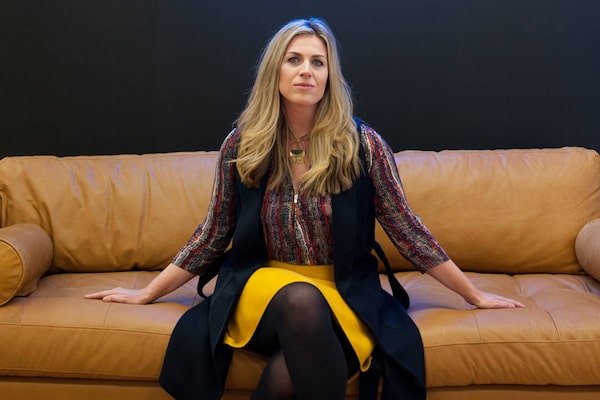
Joanna Griffiths launched a Kickstarter campaign in 2015 for her bra design, eventually raising just over $1-million (U.S.) from nearly 14,000 backers.Galit Rodan/The Globe and Mail
When Joanna Griffiths started her leak-proof underwear company Knixwear Inc. in 2012, her original plan was to expand her product line into yoga pants. As it turned out, customers were already pretty happy with their yoga-pants options.
But there was one thing women were completely dissatisfied with: their bras.
Specifically, women hate the underwire inside many bras – that thin piece of metal under the breasts that provides lift and support, but which also digs into wearers' skin, often leaving welts.
As a woman, Ms. Griffiths knew that discomfort intimately. As an entrepreneur, she knew that making a wireless bra would be extraordinarily technically challenging.
"People said, 'Promise me you're not going to make bras. It's too hard, you're not going to be able to do it,'" says Ms. Griffiths, 33, who previously worked in strategic marketing at CBC and Universal Music Group.
Against that advice, she developed a prototype and wore it herself for a month.
In focus groups, 200 women shared with her their biggest pain points. Besides the underwire, sizing was also a major issue, especially for large-busted women who often have trouble finding something in their size.
Ms. Griffiths then launched a Kickstarter campaign in 2015 for "the world's most advanced bra," eventually raising just over $1-million (U.S.) from nearly 14,000 backers. "I felt like it was the best product we'd ever made," she says.
Once Toronto-based Knixwear began shipping its Evolution bra, the reviews came rolling in. They were mostly positive, but there were also some comments Ms. Griffiths "just couldn't ignore." After receiving feedback from the first 20,000 customers, the company stopped production for four months to fine-tune the product.
The company has since launched V-neck and padded versions of the Evolution bra, as well as a longline bra, which covers more of the torso. Soon it will add a high-impact sports bra and a tank top with a built-in bra to its online store. Current sizing goes up to 42DDD/E.
Knixwear also pivoted to doing primarily direct-to-consumer online sales. Previously it sold its products through third-party vendors, but it was tough to keep product in stock when inventory was distributed over so many stores. Consolidating its supply reduced order-processing times and improved the customer experience, says Ms. Griffiths. "We've grown our online sales 2,000 per cent over the past 12 months." The company is on track to do $20-million in sales in 2017, she adds.
With a team that has grown from five employees a year ago to 25 today and a projected 50 by the spring, Knixwear is expanding rapidly. Knixwear just moved into its new 11,000-square-foot home near Toronto's Trinity Bellwoods Park, nearly 10 times the floor space of its previous headquarters.
This growth has come despite the company turning down outside investment.
After doing a round of pitches in Silicon Valley, Ms. Griffiths got an investment offer of $7-million. Wanting to retain control of the company, she turned it down and went home.
"Turning down $7-million is terrifying, but at the same time, it's super, super empowering to say, 'We don't need this,'" says Ms. Griffiths. So, for now, she is committed to growing the company organically, on her own terms. She is, however, considering non-dilutive forms of financing to help scaling efforts.
For ages, prioritizing women's comfort has been a revolutionary concept. Knixwear's unlined bras don't change or accentuate the shape of the breast; they are just meant to be comfortable.
Candice Faktor, a Toronto investor with Faktory Ventures, notes that societal changes in how women participate in finance and the labour market has changed dramatically over time, yet products meant to serve women haven't evolved quite as quickly.
"The entire world is being reinvented and transformed by technology," says Ms. Faktor. "I definitely believe there is a tremendous opportunity in reimagining the world from a woman's perspective."
According to research, women today control 75 to 85 per cent of all household spending and purchasing decisions. This influence has more and more companies – even ones making gender-neutral or traditionally male-oriented products – now seeking to capture women's business.
As well, the push for personalization – that is, leveraging customer data to make highly targeted products and services – is enabling companies, especially boutique brands, to cater to underserved markets. Market-research firm Boston Consulting Group estimates that personalization in retail, health care and financial services will cause an $800-billion revenue shift over the next five years.
"I think there's a lot more thoughtfulness about experience and impact [and] designing experiences that different people want, and that it's not for everybody," says Ms. Faktor. "There's more diversity and demand for personalized experiences."
Even though Knixwear's bras and underwear are not customizable, Knixwear is still aiming for personalization. It created its own sizing system and offers expanded sizes, adopted a tone on social media the company considers familiar and authentic and positioned itself as a champion of diversity by using collaborative design (through feedback from customers) to address a pain point widely felt by its clientele.
"Fit is so personal, so people will like different things," says founder Ms. Griffiths.